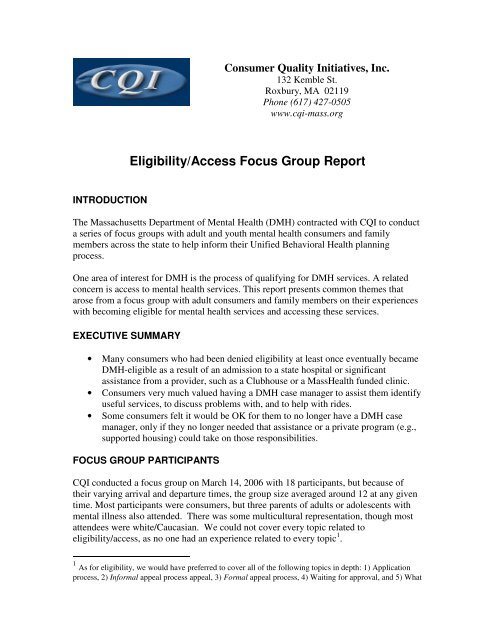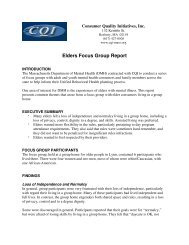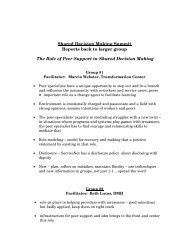Eligibility/Access Focus Group Report - Consumer Quality Initiatives
Eligibility/Access Focus Group Report - Consumer Quality Initiatives
Eligibility/Access Focus Group Report - Consumer Quality Initiatives
- No tags were found...
Create successful ePaper yourself
Turn your PDF publications into a flip-book with our unique Google optimized e-Paper software.
<strong>Consumer</strong> <strong>Quality</strong> <strong>Initiatives</strong>, Inc.132 Kemble St.Roxbury, MA 02119Phone (617) 427-0505www.cqi-mass.org<strong>Eligibility</strong>/<strong>Access</strong> <strong>Focus</strong> <strong>Group</strong> <strong>Report</strong>INTRODUCTIONThe Massachusetts Department of Mental Health (DMH) contracted with CQI to conducta series of focus groups with adult and youth mental health consumers and familymembers across the state to help inform their Unified Behavioral Health planningprocess.One area of interest for DMH is the process of qualifying for DMH services. A relatedconcern is access to mental health services. This report presents common themes thatarose from a focus group with adult consumers and family members on their experienceswith becoming eligible for mental health services and accessing these services.EXECUTIVE SUMMARY• Many consumers who had been denied eligibility at least once eventually becameDMH-eligible as a result of an admission to a state hospital or significantassistance from a provider, such as a Clubhouse or a MassHealth funded clinic.• <strong>Consumer</strong>s very much valued having a DMH case manager to assist them identifyuseful services, to discuss problems with, and to help with rides.• Some consumers felt it would be OK for them to no longer have a DMH casemanager, only if they no longer needed that assistance or a private program (e.g.,supported housing) could take on those responsibilities.FOCUS GROUP PARTICIPANTSCQI conducted a focus group on March 14, 2006 with 18 participants, but because oftheir varying arrival and departure times, the group size averaged around 12 at any giventime. Most participants were consumers, but three parents of adults or adolescents withmental illness also attended. There was some multicultural representation, though mostattendees were white/Caucasian. We could not cover every topic related toeligibility/access, as no one had an experience related to every topic 1 .1 As for eligibility, we would have preferred to cover all of the following topics in depth: 1) Applicationprocess, 2) Informal appeal process appeal, 3) Formal appeal process, 4) Waiting for approval, and 5) What
THEMESBecoming DMH eligibleOne becomes eligible for DMH services when a DMH area office determines that theperson meets the criteria for illness severity and financial hardship. Many consumers whohad been denied eligibility at least once eventually became DMH-eligible because theywere deemed in need of services after an admission to a state hospital or via significantassistance from a provider, such as a Clubhouse or a MassHealth funded clinic.A number of consumers and parents said the applicant had initially been denied eligibilitybecause s/he was not considered sick enough (e.g., non-psychotic, non-suicidal) or had anon-qualifying diagnosis (e.g., traumatic brain injury (TBI), a personality disorder). Theperson then followed one of two general paths to eligibility. In some cases, the person’ssituation got much worse, including homelessness, bad accidents and/or jail or prison,and they then ended up in a state hospital. Once in the state hospital, it appears that apatient is then fast-tracked for DMH eligibility 2 .In other cases, the person got significant assistance from a provider, even though theirsituation had not necessarily worsened. Clubhouses played a significant role in helpingpeople gain eligibility, with both staff and Clubhouse members providing assistance toconsumers. Also, some people had MassHealth, and then obtained services at a clinic orday program; that program would make efforts to help them gain DMH eligibility. Theseconsumers were able to benefit from the skill and experience of Clubhouses andoutpatient providers; in some cases, it was as straightforward as helping them obtain anAxis I diagnosis, not just an Axis II or TBI diagnosis.One consumer’s story:Joseph 3 explained that when he initially did not qualify as DMH eligible he was verydiscouraged. He said, “I felt very lost, very confused. I thought it was a way out of beinghomeless. When I was denied access to a stepping stone, I was very discouraged.” Hethen spent several years at a variety of shelters and programs before he was diagnosedwith bipolar disorder. When the program helped him apply again, he was approved. He’snow doing very well in a supported housing program and is looking forward to taking onmore hours in his job.<strong>Access</strong> to DMH Services once DMH-Eligiblehappens once approved as DMH eligible. We covered nos. 1 & 5 in some depth, but not nos. 2-4, sincenone of the participants had gone through, or could recall in a meaningful way, any kind of appeals process.They took another approach instead, as noted in the text.2 When a person goes into a state hospital, information needs to go to the parents/family members on DMHservices. Parents whose children were admitted to the state hospital were very unclear about the processand eligibility for DMH services.3 Not his real name.
<strong>Consumer</strong>s felt that care coordination and rides/transportation were critical for them toaccess services and activities. Transportation to activities, such as art classes andemployment, was difficult or impossible outside of normal business hours. Theyreceived this kind of help from a variety of people/organizations, including casemanagers and supported housing staff, and to a lesser degree Clubhouse staff.Participants very much valued having a DMH case manager to assist them identify andaccess useful services, as well as to discuss problems and to help with rides. Often whenpeople were hospitalized they did not hear from their case manager. The hospital socialworker seemed to take over. Some saw this as a problem, and wanted to know that theircase manager was still there for them. Others understood that the case manager’sinvolvement might be duplicative of the social worker’s efforts.Several people noted that they had difficulty getting a new case manager if theirs had left.One person said, “They don’t stay too long. It takes a long time to get a new one.” Oneperson said the case managers work best when you first get released from the hospitaland when you need housing. Another said, “It seems like she’s helping me. I’m not evensure what she’s doing. If I need help with MassHealth I called her. It just seems like she’sworking.”Many consumers felt it would be OK for them to no longer have a DMH case manager,but only if they no longer needed that assistance or a private program (e.g., supportedhousing) could pick up the case manager’s role. Some recognized that it was often therole of supported housing staff to take over the case manager’s role, at least to a degree.We heard a variety of experiences with supported housing here. One person (Josephabove) attributed his improvement to his supported housing program helping himstabilize and find a job. Others were less confident that their supported housing programcould help them get places or access services.A few participants found Clubhouses to be a valuable resource in helping to organizetheir care, but noted that services are generally based at the Clubhouse, and that outreachconsisted of phone calls. Thus, the Clubhouse did not replace the role of a DMH casemanager.<strong>Access</strong> to needed non-DMH servicesSome participants felt that they could gain admittance to a private psychiatric hospitalwhen needed, but that the length of stay was not sufficient for them to stabilize on newmedications. When hospitalizations are too short, they see hospitals as revolving doors.Several participants were concerned that MassHealth has not been providing appropriatedental coverage and that people are not getting the dental care they need.For more information, contact Jonathan Delman, 617-427-0505, jdelman@cqi-mass.org132 Kemble Street * Roxbury, MA 02119




